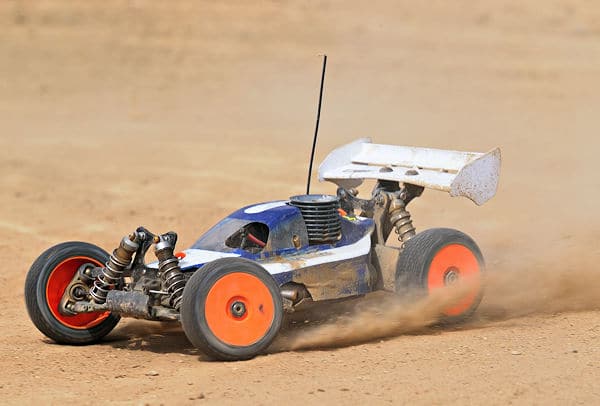Remote Control Cars

History of the RC Car
Radio Controlled (RC) cars have thrilled hobbyists worldwide since their advent in the 1966. The very first RC Car, a 1:12 Ferrari 250LM, was produced by Elettronica Giocattoli and was available in the UK in December of 1966. Soon, commercial products were being produced throughout the world. The United States caught the RC fever particularly hard, and the tradition of racing RC cars developed. The Remotely Operated Auto Racers (ROAR) held their first national championship in the United States in 1968, and the first On-Road Gas World Championship was organized and run in 1979.
The first commercial wholly electric-powered RC car became available in 1974. Up to this point, RC cars were powered by gas or nitro. When electric cars were developed, they became more feasible for families and children to own and use. Since then, the RC car has become a staple gift for children across the world.
Types of RC Cars
There are two main types of RC Cars: toy-grade cars and hobby-grade cars.
Toy-Grade RC Cars
Toy-grade RC cars are designed to reduce costs. These cars have fewer parts than the hobby-grade cars, allowing them to be cheaper although more difficult to repair. Most of these cars are modeled after full-scale cars, from sports cars to Hummers. Toy-grade RC cars vary greatly in price, mainly ranging from $10 to $35 for a basic model. These are the best RC cars to teach kids on.
Hobby-Grade RC Cars
For the more dedicated RC car hobbyist, there are a wide range of more intricate and technically advanced RC cars. Hobby-grade “ready-to-run” (“RTR”) kits that require minimal assembly have become available in recent years, giving potential hobbyists an easier segue into the hobby. For hobby-grade cars, there are electric, gasoline-powered, and nitro-powered models. These are the best choice for adults. If you are looking to choose one of these, check out our post about fast remote control cars for adults.
How RC Cars Work
A standard RC Car has four main parts:
• Transmitter: The handheld control used to navigate the RC car is called the transmitter. This part sends radio waves to the receiver.
• Receiver: This part of the RC car accepts and interprets radio wave instructions sent by the transmitter.
• Motor: The motor powers the car to move, physically controls the steering, and operates other features your RC car may have.
• Power Source: Whether powered by electricity, gas, or nitro, every car has a source of power to stimulate the motor. Toy-grade RC cars most commonly run on rechargeable packs or batteries.
These main parts work in a system. When you use the transmitter to signal the car to move forward, the transmitter sends out radio waves. The radio waves are sensed by the receiver, and the receiver in turn cues the motor to function. The motor gets power from the power source to move the car forward. As you change signals on the transmitter and tell the car to go faster, slower, turn, or move in reverse, the receiver interprets the unique signals to move the motor differently.
Toy-Grade RC Cars Buying Guide
Choosing a toy-grade RC Car is mostly dependent on the appearance of the car. Here’s some questions you may want to ask yourself:
1. Am I buying an age-appropriate RC Car? These cars are available in different age ranges. With increasing age ranges come more complicated controls. Cars commonly come in a suggested age range of 1-5 or 6-12.
2. Should I get a toy-grade or hobby-grade RC Car? If your child has a tendency of playing hard with toys for a few days then throwing them to the curb, you may want to go with a toy-grade car. But if your child seems like they’ll really take off with this passion, you may want to consider investing in a hobby-grade car so they can see the potential of this hobby.
3. Does the marketing paint a misleading picture? Though the package may boast an “easy-to-drive” car, be wary of empty promises.
4. What are the reviews on this car? Check out reviews of the car on retailer sites to see how other buyers like the product. Checking reviews online is a great step to ensuring you don’t get a car that’ll quit after the first use.
5. Is this the right kind of vehicle? If you buy your NASCAR loving son a Hummer RC car, he may not stay very interested. Similarly, don’t assume that your daughter will only like a Barbie brand neon-pink RC car. Be sure to consider what your son or daughter would like best when choosing your RC car.
6. How will my child use this car? If you think your kid will spend most of their time cruising through the house, you may not need a car with a four-wheel drive feature. If they’re going to be making miniature race courses out of rocks and sand piles in the backyard, you might want to invest in a tougher model.
Hobby-Grade RC Cars Buying Guide
Hobby-grade cars are a bit more intricate than toy-grade. Here’s some important questions to ask before making a decision:
1. Am I dedicated to keeping my car well-maintained? More expensive cars require regular maintenance to keep them running at their best capacity. Many would-be hobbyists get overwhelmed by the demands of their cars and quit prematurely. Make sure you factor in time spent cleaning and repairing your RC car.
2. What do I want to do with my car? Do you see yourself driving your car through rocky trails or racing at top speeds? Different cars have different capabilities. Spend some time thinking about what you want to spend time doing.
3. What kind of power source do I want? While most cars are electric, there are some cars that are powered by gas or nitro. While it’s tempting to jump in with a top-of-the-line nitro car, these cars are incredibly fast, powerful, and expensive. Nitro cars are mainly for experienced hobbyists who know how to properly drive and care for these cars.
Understand that hobby grade RC cars are going to cost more than their toy grade counterparts. Still, there are some good deals to be had on hobby grade cars. We compiled a list of the best RC cars under $200.
Most importantly, consider visiting a hobby store and talking to people. Hobby stores are a great place to meet knowledgeable staff members and fellow enthusiasts who can help you get started with this exciting and rewarding hobby.
Get Started Today!
Do RC cars seem like a passion you could get behind? Visit a local RC car hobby store or online retailer today! If you are looking for a fast, but affordable RC car, make sure you check out our article fast RC cars under $50. Both toy-grade and hobby-grade RC cars are available for you or your children, so you can zoom away with this fun new hobby!
